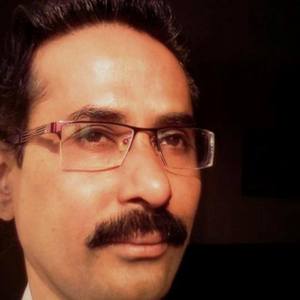Problems in one’s life are mostly passed onto them by their parents.
Many parents try to decide their children’s future and thus, their
destiny. Children may or may not fulfil their parents’ aspirations.
Nevertheless, they strive, or are forced to strive to fulfil these aspirations
by their parents. Now, there are two types of parents: those who were
successful and those who dreamt, tried, but failed in life.
The successful parents think that if they could achieve something,
their offspring should achieve at least the same in manifold.
Normally, the society in which the offspring grows is conducive so
that the parent’s vision is realised. However, when the child is born
with genes that may have bypassed a few generations, there could
be a confrontation.
Failed parents may not necessarily have failed at everything.
They may simply be underachievers. Few persons may have the
ability, but may have chosen to lead a mediocre life willingly,
as there never was any goal in their life; they live life to the
fullest, and never compel their children. They know the value
of life and respect it. Now, if there was a person who was able,
had the means of achieving but had not tried, they simply leave
everything to fate and may not compel the kids, the philosophy
being that they can adapt to changing needs. Those who tried,
but failed due to circumstances, would subject their children to
grinding; explaining the demands of the world that are more than
the abilities of their parents, who were talented enough to succeed
but somehow couldn’t.
Children who were brought up in the latter way, would be
psychologically broken if they failed to achieve the set goals.
If they could accomplish the benchmark set by their parents,
not only would they become overachievers, but the intellect
somehow turns out to be negative.
Though all this was postulated by Rizwan Choudhary, after
analysing his friends, relatives, colleagues and so many others, his
case could not be categorised in any of the above. He felt, he has a
unique father who has a sort of peculiar psyche and so his problems
were also unique.
His father, Senior Choudhary, was a native of Lahore and was two
years senior to Qadar at the university. However, unlike Qadar,
he chose to return to his country immediately after education,
without pursuing a career in the West. Though the reason was the
overwhelming riches of his family, it could not satisfy the academic
yearning. When Qadar offered him a position in the newly
established institution, Choudhary readily accepted it. Over time,
however, he could not digest the fact that he was working under
his junior. As Qadar was the son of a migrant, Choudhary always
felt he should have established the institution and his own failure
to do so necessitated an outsider like Qadar to launch the research
in the nascent nation. The worst part was that he enjoyed Qadar’s
immense confidence, and could never counter any of his deeds.
He, however, resolved that his son would someday head the
organisation, and be a part of something crucial for the motherland’s
concerns. He was glad when Qadar was booted out which was
unexpected. Due to his own proximity to Qadar, he was not offered
the position of head. He cursed himself for being close to Qadar. By
the time Qadar left, Rizwan Choudhary was a middle-level scientist
in the setup. In fact, Qadar treated Rizwan like his own son and
shared his knowledge without any prejudice. Senior Choudhary
started working overtime to push his son’s career.
Here came the problem. Rizwan, who was deeply involved in the
schemes of Qadar, already knew that Qadar had arranged to ship
some nukes and their technology from Korea. He knew it was
done only on the instructions of the then political authorities, who
immediately wanted to conduct a test in response to India’s. For
Rizwan, what Qadar had managed in that difficult situation was
the most patriotic thing he witnessed in his life. Rizwan admired the
guts and endeavours of Qadar, despite being a migrant to Pakistan.
He compared his own father, who paled in comparison to Qadar.
When Qadar took the blame completely and absolved anyone else,
Rizwan’s veneration towards Qadar grew manifold.
In contrast, his own father, trying to manipulate the system to further
Rizwan’s career, appeared as a greedy exploiter whose interests were
not so aligned with those of the nation. Regardless of his father’s
attempts to better his career and life, Rizwan slowly detached himself
from his father. He became more nationalistic. Unconsciously, he
began to model himself after Qadar and was constantly in search of
some mission to contribute to the nation’s interests.
Senior Choudhary sensed something fishy when all four young
mid-level scientists were called to meet Pasha. He got in touch with
the head of ISI but could not get full details apart from the fact that
Pasha was more active in the recent past. The next stop was Pasha’s
boss, who informed in confidence that something big was being
planned and it concerned the scientific establishment. He excused
himself, claiming he was not aware of details. “I am going to retire
in a year and am not part of operations related to future plans. I
don’t want the burden of unnecessary information and knowledge
and spend my old life under restrictions,” he put it straight and
dismissed the old scientist.
Rizwan was instructed to impress Pasha and get selected for the
mission. “This is going to be the next big thing. Probably bigger
than what Qadar did. This is a once in a lifetime opportunity. I
wasted my chances, and I do not want you to repeat my mistakes.
This is the time for you to don the mantle that rightly belongs to
you. Be the leader who safeguards the nation’s interests. For the
sake of the motherland, come out of shadows. Be the torchbearer,”
he tried to pump up his son.
Rizwan listened carefully. Though his father’s speech didn’t have
any effect on him, the fact that this was the next big thing was
enough to encourage him to give his best. Moreover, he knew
the significance of Pasha in military affairs. If Pasha was working
overtime, probably, it really was the next big thing. Being a part of
something that was in the national interest itself is a motivation and
Rizwan decided to give his best.
* * * * *











Comments (0)
See all